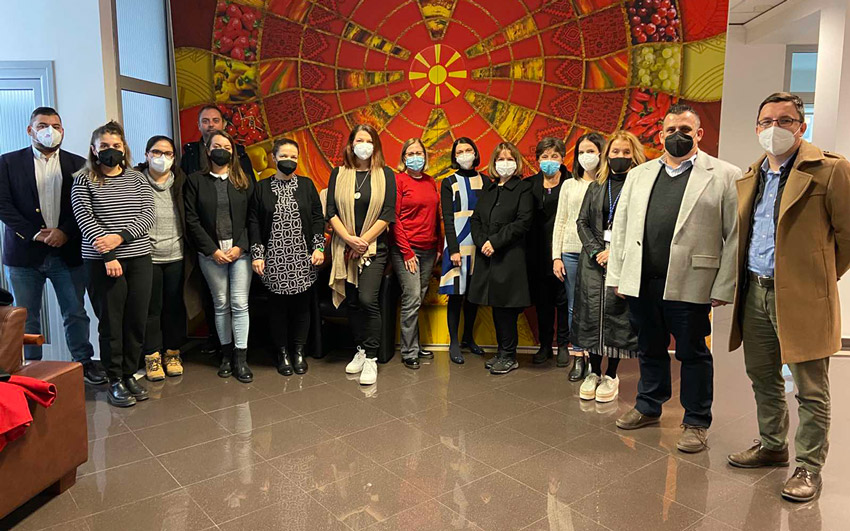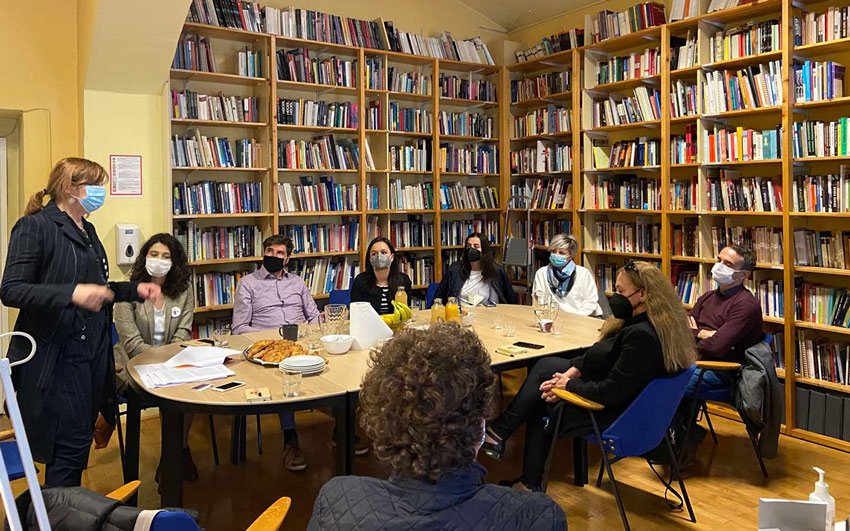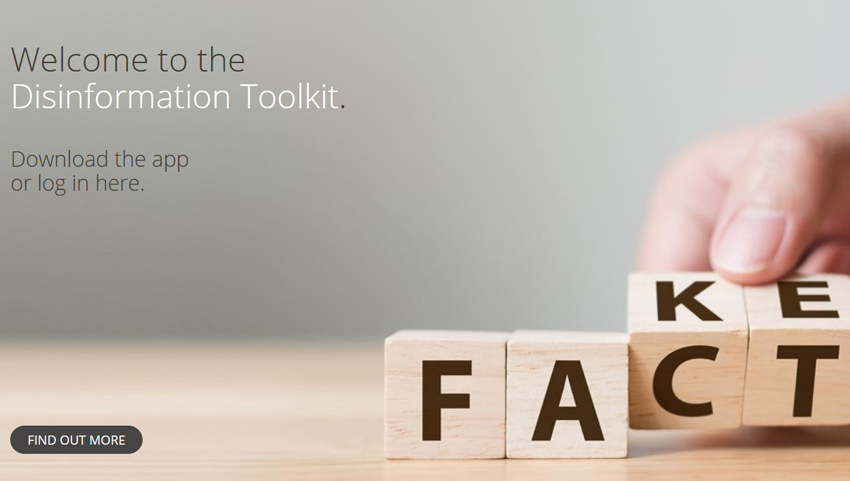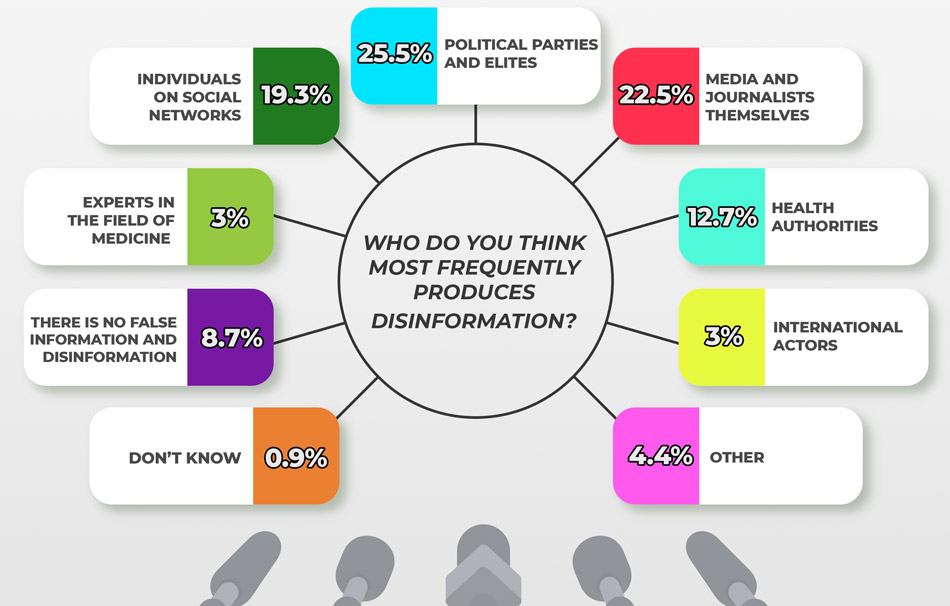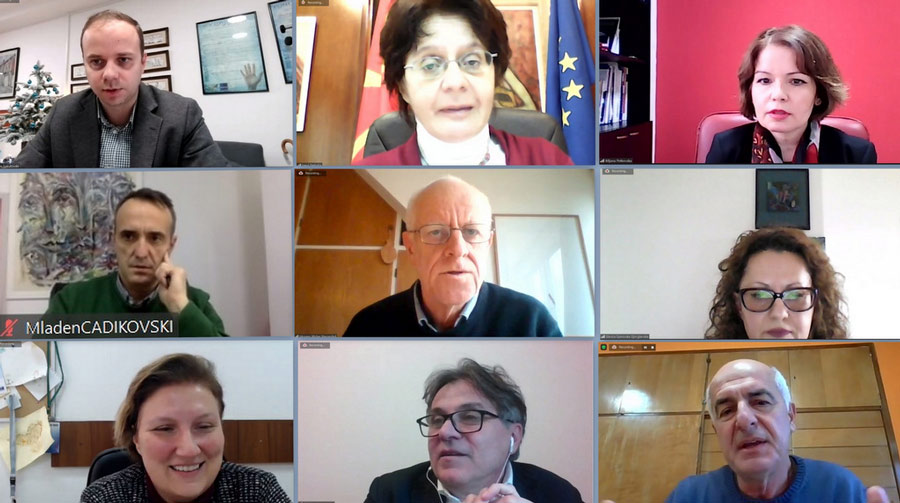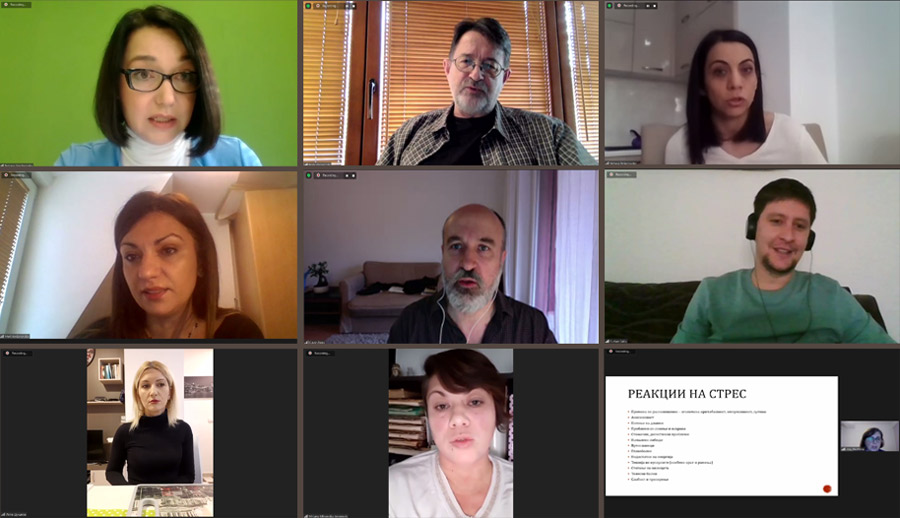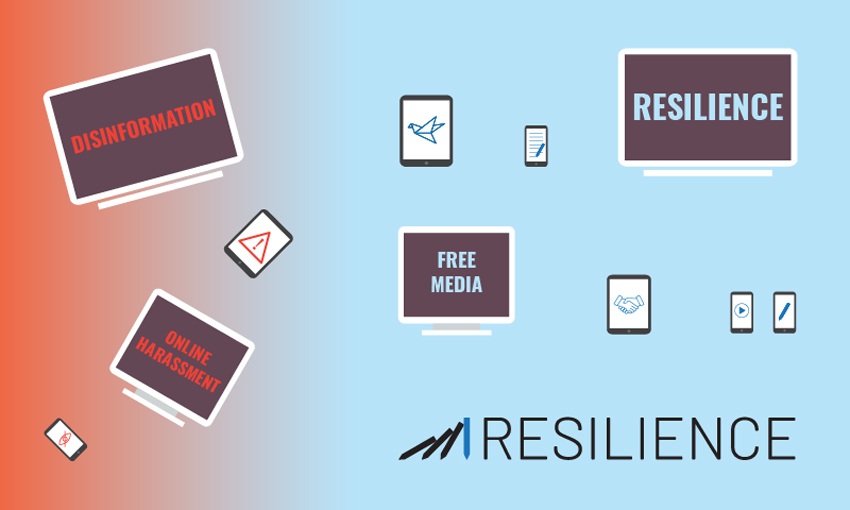Empowering youth with critical thinking skills for resisting disinformation and building active and responsible citizenship
The U.S. Agency for International Development (USAID), in partnership with IREX, the Macedonian Institute for Media (MIM), the Ministry of Education and Science and the Bureau for Development of Education launched the new Media Literacy Project YouThink. This five-year project brings Macedonian and international partners together to work with young people to develop the critical thinking and information engagement skills they need in order to build resilience to disinformation, thus contributing to building active, responsible, and empathy-driven citizenship.
IREX will implement the project in collaboration with the Institute of Communication Studies, the Youth Educational Forum, and a first-of-its-kind youth steering committee, Learn to Discern (Учат да распознаваат), which was established to ensure that the young people in the country play an important and active role in activity design, leadership, and decision-making on national and local level.
Ambassador Kate Byrnes emphasized that "no matter what the source, information is only powerful if people know how to use it. Those who use information responsibly will strengthen social cohesion, demand good governance, and take initiative to improve the lives and prospects of their families and communities."
The Minister of education and science, Mila Carovska in her address stressed that the new educational programs that are being implemented from 2021, should contribute to shaping generations who have more knowledge and skills for combating with fake news. “The citizens who have critical thinking skills actively participate in the public debate and they influence the changes. They challenge the institutions to be more transparent and accountable, which is really necessary for progress of the society that cares for everyone and for the economic growth and development of the state.”
Mihajlo Lahtov, the Project Director, emphasized that it is essential to work with young people from a very early stage and help them develop skills and habits they need to build resilience against disinformation. “USAID's Media Literacy Project YouThink will mobilize strategic partnerships across society to push for inclusion of media literacy concepts and critical information engagement skills in standard coursework through schools and universities at all grade levels, but also through non-formal activities at youth-led and youth-serving clubs and organizations,” Lahtov said.
Expressing his support for initiatives to improve the quality of education, Zekirija Hasipi, the Director of the Bureau for Development of Education, informed that media literacy is part of the new educational programs in purpose of “equipping students with skills for critical thinking, analyzing different forms of expression and incorporating media literacy.”
MIM Director Biljana Petkovska highlighted that “it is of key importance for primary and secondary teachers to acquire knowledge, skills, and educational resources through the project that will enable systemic integration of media literacy in the educational process.”
At the launch’s youth debate, five panelists from diverse backgrounds discussed the importance of media literacy in the information landscape today and of integrating such skills and resources into classrooms, so the young people could become more active actors in the society.
The panelists addressed various ways disinformation affects their lives and their communities, as well as possible mechanisms for combating this phenomenon. All participants emphasized that media literacy and critical thinking skills are indispensable for navigating the 21st Century information environment in a safe and responsible manner.
In addition, IREX, MIM, the Ministry of Education and Science, and the Bureau for Development of Education under the umbrella of the Ministry signed a Memorandum of Understanding that reflects their cooperation and charts a clear way forward for the systemic introduction of media literacy and critical information engagement skills and concepts into primary and secondary school curricula throughout North Macedonia.
NOTE TO EDITORS:
The American people, through USAID, have invested more than $833 million in North Macedonia since 1993. USAID is the world’s premier international development agency and a catalytic actor driving development results. USAID’s work advances economic prosperity, demonstrates American generosity, and promotes a path to recipient self-reliance and resilience. Follow USAID in North Macedonia on Twitter, Facebook, YouTube and Web site.
The photo gallery of the event is available here.
News
Macedonian Institute for Media (MIM), supported by the EU Delegation organised a study visit to Brussels in the period of 8-11 November, for journalists and civic activists from the field of media.
The visit was organised with the goal to assist in strengthening relationships and building synergy among media, civil society and institutions in fighting disinformation, as well as to promote media literacy in our country.
Participants had the opportunity to discuss with relevant representatives of European institutions, such as the Western Balkans Task Force on Strategic Communications within the European External Action Service (EEAS) as well as media organisations and associations headquartered in Brussels.
Discussions in the meetings focused on the need for institutional response to disinformation and the importance of building partnerships among relevant stakeholders, as well as activities undertaken by the European institutions in this sphere, including EU relations with private companies and platforms such as Facebook, Google, YouTube and others.
Among other things, it was pointed that there was need of increased transparency and publishing the criteria that these social networks use in removing content published by users.
During the meetings with the representatives of the European Federation of Journalists, UNESCO and the European Association for Viewers Interests (EAVI) the conversation focused on the latest activities that these organisations have undertaken in strengthening co-operation between media and civil society and the necessity of improved professionalism in media reporting and effective resilience to disinformation. The interlocutors underlined the need for designing new, creative approaches for advancing citizen knowledge and skills, to be able to recognise and deter manipulative content, since methodologies and technological innovations for creating and disseminating disinformation are continuously perfected.
Within the study visit to Brussels, the group met ambassador Agneza Rusi-Popovska and members of the Mission of the Republic of North Macedonia to the EU. During the meeting they discussed relevant themes in relation to our country’s European integration process and informing citizens about these issues.
The Macedonian Institute for Media, with support of the Delegation of the European Union in Skopje organised a study visit to the Republic of Slovenia in the period of 4-8 October, for journalists and representatives from civil society organisations that work in the media sphere in the country.
The goal of the visit was to exchange experiences with Slovenian colleagues about themes and issues in regard to modern challenges for media and the public communication space, with focus on disinformation, fact-checking, false narratives and influence of social networks in redefining journalism, as well as misuse of the public communication space in spreading hate speech.
During the visit, Macedonian representatives met renown investigative journalists from the online media Podčrto and Oštro, civic activists and media experts from non-governmental organisations Umanotera and the Ljubljana Peace Institute, representatives from the Association of Journalists of Slovenia, as well as editors in chief of news services in the public broadcaster Radio Television Slovenia.
The visit was also an opportunity to attend the EU Summit which took place on 6 October in Brdo, wherefrom journalists reported for their media outlets.
Slovenian media space faces numerous challenges in regard to the current political developments in the country, which are also due to the influence of new communication technologies, particularly the social networks, on everyday life of citizens.
Without exception, the necessity of protection, support and affirmation of professional journalism as a public good was underlined in all meetings, which is of essential importance for advancing democratic processes. It was concluded that media freedoms largely depend on the democratic capacity of the authorities, who often use various mechanisms which may jeopardise or contest those freedoms. Financial dependence of media from authorities’ decisions may become a serious obstacle for regular functioning, mostly for the public broadcasters and news agencies owned by the state. Therefore, it is necessary for the public broadcasters to be financed largely by the funds collected through the broadcasting fee, not from the state budget, as it was underlined by the participants in the meetings. Regarding false narratives, it was highlighted that the battle against them could be won only by quality journalism that serves the citizens, by inciting media literate public and by encouraging overall societal support for the existence and development of free media.
Albany Associates has created an app that provides a step-by-step toolkit for identifying dis, mis, and mal-information in the Western Balkans using online tools. It is particularly useful for journalists running across suspicious content in their daily work. It was developed in close collaboration with a regional network of independent media development partners and with the support of the United Kingdom's Foreign Commonwealth & Development Office.
The regional network was led by Mediacentar Sarajevo and includes the Albanian Media Institute, KosovaLive, the Macedonian Institute for Media, the Montenegro Media Institute, and Novi Sad School of Journalism in Serbia. Internet connection is initially needed to download the app onto a mobile device or computer, and then the app can be accessed at any time offline. The app is available in Albanian, Bosnian, Montenegrin, North Macedonian and Serbian, and these versions can be found by following the steps below:
Download the app “Disinformation Toolkit” from the App Store or Google Play, or go to nimbl.uk
Click ‘Register' and enter your details: e-mail address and own choice of password
Download the toolkit in your language
Macedonian Institute for Media in cooperation with M-Prospect agency conducted a survey of citizens’ views regarding media reporting during the COVID-19 pandemic. The telephone survey was conducted 14-20 December 2020, at a random sample of 1003 respondents.
The respondents were asked how much they agreed with the statement that media have been reporting professionally and impartially during the COVID-19 pandemic. According to their responses, every fourth respondent (25%) completely agrees with this statement, 39 % somewhat agree, 21.8% somewhat disagree, whereas 13.6% completely disagree. Considered cumulatively, the percentage of those who consider that the reporting has been professional and impartial is 64.1% and is larger than the percentage of those who disagree, which stands at 35.4%.
Analysis of the responses shows that the agreement with the statement for professional and impartial reporting increases with age. Thus, 19% of the 18-29 age group completely agree with the statement that media have been reporting professionally and impartially during the COVID-19 pandemic, the percentage with the 30-64 age group is 22%-23%, whereas with the age group above 65, the percentage is higher and stands at 36%. Nearly every third ethnic Macedonian, or 29.4%, completely agrees with this statement, in comparison to 13.3% of the surveyed ethnic Albanians.
Media in which citizens have most frequently spotted disinformation and false information are mainly the social media (28.8%) and the television channels (26.8%). Nearly 19 % of the respondents said that they had spotted disinformation and misinformation on the internet portals, 8.7% in print media, around 4% on radio. 12% hadn’t spotted disinformation and misinformation. It is notable that the younger generations, from 18 to 39 years of age highlight social media and internet portals as types of media where they spotted disinformation and misinformation in comparison to the older, especially those above 50, who highlight television as a source of disinformation and misinformation.
From those that had pointed social media as source of disinformation and misinformation, the largest percentage (84.5%) pointed Facebook, 7.6% YouTube and 5.8% the social network Twitter.
False, unchecked information and disinformation is what the majority of respondents (39.7%) object to in the way how journalists report. 15.3% of the respondents said media bias towards certain political centres of power bothered them, 13.5% have a problem with discrimination of certain groups in society and hate speech, 12% pointed that sensationalism in reporting bothered them, 8.3% said it was disrespect of privacy and 9.6% said had no complaints for journalistic reporting.
Looked through the prism of ethnicity, the results differ with ethnic Macedonians and Albanians – sensationalism, discrimination of certain societal groups and disrespect of privacy in reporting was more frequently mentioned by the ethnic Albanians, whereas the ethnic Macedonians objected more to the reporting of false, unchecked information and disinformation, as well as the bias towards the political centres of power.
Regarding themes for which the respondents spotted false information and disinformation, largest percentage (22.7%) point to themes about number of people infected with coronavirus, then vaccine safety (13.7%), treatment of the virus infection (12.1%), origin of the virus (11.3%), availability of tests (11.2%), religious festivities of Ramadan Bayram and Easter (8.8%), as well as the parliamentary elections and the pandemic (4.7%), the beginning of the school year during the crisis (2.7%). The percentage of those that hadn’t spotted disinformation and false information is 8.4%.
Regarding the issue of who produces disinformation and misinformation, every fourth respondent said the political parties and elites did (25.5%), more than a fifth (22.5%) said the journalists and media themselves, 19.3% said individuals on social networks, 12.7% said the health authorities. Experts from the field of medicine and international actors were pointed by 3% of the respondents.
Ethnic Albanians to a greater degree more than ethnic Macedonians consider that health authorities themselves cause disinformation (26.2% in comparison to 8%).
Two thirds of the respondents (69.6%) said they were satisfied by the quality of information from the institutions during the pandemic, with 22% saying they were completely satisfied, whereas 47.6% said were somewhat satisfied. Thus, the percentage of respondents who are satisfied by the quality of information communicated by the institutions during the pandemic is larger with the ethnic Macedonians.
When asked which sources of information respondents trust most during the COVID-19 pandemic, domestic TV channels (50.5%) are the most frequent choice and nearly one quarter (23.8%) trust most foreign TV channels. The percentage of those who trust the information received from social media friendships is 7.8%. Information published by the internet portals was trusted by 5% of the respondents and 4.1% trusted printed media. However, this data should be considered into the context of general decrease in newspapers readership and growing migration, especially of the younger audiences, online. Trust in domestic TV channels grows with age, especially with those above 50, whereas trust in internet portals and information received via social media friendships is highest with the 18-49 age group and afterwards decreases.
Those who responded to whom they trust most as a source of information, were asked also why they trusted the said sources. Accurate and timely reporting was the reason for 41.3% of the respondents, impartial reporting for 30.5%, diverse and comprehensive reporting for 20.2%, and for 5.8% reporting without sensationalism was the reason for trust.
Respondents also answered the question whether they consider if certain marginalised societal groups were sufficiently represented in media reporting during the COVID-19 pandemic. Every third respondent (37.6%) considers that women were insufficiently represented in reporting, in comparison to nearly 60% who considered that they were sufficiently represented. Every other respondent (48.7%) considers that children were insufficiently represented. There is division of views when it comes to media representation of Roma (45.2% who consider that they were sufficiently represented, in comparison to 50.5% who consider they were not). Every other respondent considers that the LGBTI community was insufficiently mentioned. There is similar distribution of responses for disabled persons – 45.2% consider they were represented, in comparison to 50.3% that they were not.
DEMOGRAPHICS
20.2% of the respondents are aged 18-29, 18.7% are in the 30-39 age group, 18% are aged 40-49, 21.4% belong to the 50-64 age group and 21.5% of the respondents are above 65 years of age.
72% of the respondents are Macedonians, 23.2% are Albanians, 4.8% have declared other ethnicity.
3.2% of the respondents haven’t completed elementary school, 15.2% have completed elementary school, more than half of the respondents (55.5%) have completed high school, 5.6% have completed college, 18.9% have completed undergraduate university education 1.6% have completed postgraduate education.
16.5% of the respondents are employed in the public administration, one quarter of the respondents (24.7%) are employed in the private sector, 1.2% in non-governmental organisations, 5.0% are self-employed, 3.3% are farmers, 16.8% of the respondents are unemployed, 7.8% are students, 4.2% are occupied in domestic work and 20.5% of the respondents are pensioners.
Nearly two fifths of the respondents (39.1%) live in the country, 60.9% live in a town.
The survey was conducted within the project News and Digital Literacy Project – Where Fake News Fails, implemented by the Macedonian Institute for Media, the Institute for Communication Studies, the Independent Trade Union of Journalists and Media Workers, and the Media Diversity Institute from London, funded by the European Union.
The findings in this survey are the sole responsibility of the surveying agency and the purchaser of the service and should not be considered to reflect the views of the European Union.
Protecting the copyright in the media sphere is one of the key challenges faced by journalists, photojournalists and media workers in the country, especially after the advent of modern digital newsrooms. The legal possibilities for dealing with plagiarism and the role of the relevant institutions was the main topic of the two-day workshop organized by the Macedonian Institute for Media and the Association of Journalists of Macedonia, in order to encourage a debate among the stakeholders and exchange positive experiences on issues related to copyright protection.
During the first day of the workshop, 40 journalists, photo-reporters, media workers, lawyers and representatives of the Ministry of Culture discussed the Law on Copyright and Other Related Rights and its implementation in order to protect the rights of media workers.
In her address, the Minister of Culture Irena Stefoska, said that the Ministry is working on amendments to the Law on Copyright and Related Rights in accordance with the European standards and that soon the draft text of the Law with the included amendments will be sent for insight and opinion to all interested parties before it enters the government procedure.
The President of the European Federation of Journalists, Mogens Blicher Bjeregrerd, informed about the efforts of the Federation for improvement of the European framework related to copyright and rights of journalists. He pointed out that copyright protection is an important precondition for improving the economic situation of the media workers and that they are entitled to compensation when their copyright works are published in the media.
The participants also considered the legal specifics of the Law on Copyright in the context of the work of the media, especially from the perspective of the professional online media that suffer the most from the copy-paste journalism. Goran Mihajlovski and Aleksandar Damovski, both editors running the online media Sdk.mk and MKD.mk, respectively, cited the issue of unauthorized downloading of content from their media, noting that there were examples of court cases when some of the courts did not recognize their Internet portals as media.
Neda Zdraveva, professor at the Faculty of Law "Iustinianus Primus" pointed out that not all media products are copyright works. "Media products that are usually transmission of official texts of a political, legislative and judicial nature, as well as other daily news that have the character of ordinary - media information, simple facts and data cannot be considered copyright", said Zdraveva. According to her, in order for the media information to be considered a copyright work, it is necessary for the author or the journalist to have his own intellectual contribution in their creation.
The concept of collective copyright management and the legal practice in copyright protection of journalists and media workers were the focal topics for the second day of the workshops. The participants raised the question of unauthorized downloading of copyrighted photographs and how can the self-regulation and mediation help overcome the problem of unauthorized downloading of audiovisual content.
Arbnora Mehmeti, a photo reporter in the Meta.mk news agency, pointed out the problem of media copying photos, and the same goes for the political parties, emphasizing that all photos, even on the Internet, were created by someone, and care must be taken on respecting the copyrights.
Lawyer Natalija Milenkova pointed out that the practice has shown that it is much easier to prove authorship in photographs, while in journalistic texts it is more complicated to prove the violation of copyright, especially when there is a drastic change of the original text.
The general conclusions from the two-day event were the need for amendments of the Law on Copyrights in order to further recognize the copyright of the journalistic works, which would be considered as an important aspect in future court proceedings in which journalists would claim their rights. According to the current practice, the costs of court proceedings before the civil courts are expensive and that is one of the reasons why journalists and photojournalists rarely dare to sue, which results in a very modest court practice. High administrative costs in litigation can also lead to closure of some online media outlets that have been found to have published photos without prior consent of the authors. Additional training of judges is needed on these topics in the Macedonian judiciary, whether it is a civil or criminal court, given that there is very little practice when it comes to these acts. This is especially important in the long run, because the media workers have greater confidence in the justice system only if there fair judgments that are in line with the ECtHR practice.
The event was organized as part of the "Promoting Media and Information Literacy and Strengthening Independent Media in the Western Balkans" project implemented by the Albany Associates from London in partnership with regional media development organizations, including the Macedonian Institute for Media. The project is funded by the British Government.
A two-day workshop on “Psychological support to journalists in crisis situations” was organized by the Macedonian Institute for Media (MIM) and the Independent Union of Journalists and Media Workers of Macedonia (SSNM) that conveyed the message that the journalists, cameramen, photojournalists should speak openly but also request assistance for the psychological consequences they suffer from the stressful, crisis and traumatic experiences in the course of their works.
In the absence of institutional psychological support for media workers, Gavin Rees, Director and trainer at Dart Center – Europe as well as expert in this field, recommends that the superiors, but mostly the colleagues in the newsroom, should be the ones to recognize and will give the necessary help to the colleagues in order to deal with the consequences of stress and trauma. The way to do that, says Rees, is sincere care and careful listening to the colleagues when talking about what they have experienced, without condemnation or remarks.
Ana Blazheva, psychologist, mentioned that the journalists not only need the assistance from their living and working environment, but also professional assistance, if there is reoccurrence in the symptoms of the trauma they endured. This have proven to be very successful in resolving the consequences. According to D-r. Blazeva, the way the individual to survive through the consequences is for him/ her to accept and recognize the emotions when he/ she is facing crisis situation (in this case, the media workers).
During the workshop, five journalists and a photojournalist shared their personal experiences, but also the consequences of crises and traumas experienced while on duty, such as the Kosovo War, the 2001 conflict in Macedonia, the refugee and migrant crisis, facing infections and epidemics such as Ebola and Covid-19, but also reporting on personal human stories and socially disadvantaged people.
The workshop also talked about the psychological consequences of suffering threats and insults against journalists, but also about something that is additional stress and trauma to many journalists today - working from home and working in a pandemic. The research so far has shown that as many as 70 percent of journalists have reported psychological changes in relation to it.
The world statistics show that 80 to 100 percent of journalists have been exposed to a traumatic experience related to their work, and as many as 92 percent have experienced four traumatic experiences during their working life.
The workshop was part of the "Promoting Media and Information Literacy and Strengthening Independent Media in the Western Balkans" project, implemented by Albany Associates (www.albanyassociates.com), together with regional media development organizations, including the Macedonian Institute for Media. The project is funded by the British Government.
Nine media development organizations in the Western Balkans and Turkey have joined forces under an EU funded project "RESILIENCE: Civil society action to reaffirm media freedom and counter disinformation and hateful propaganda in Western Balkans and Turkey’".
The project’s (2020 – 2023) primary focus is on:
strengthening capacities of media CSOs and grassroot organisations through networking and cooperation regionally to improve understanding of disinformation and hateful propaganda models of media and communication in the Western Balkans and Turkey (WBT);
the ability of media and civil society to respond to and debunk false information, particularly online;
building the resilience of citizens against disinformation through the promotion of joint solution involving media professionals and other stakeholders.
The project is implemented in Albania, Bosnia and Herzegovina, Kosovo, Montenegro, North Macedonia, Serbia and Turkey.
The three-year project is coordinated by the South East European Network for Professionalization of Media (SEENPM), a network of media development organizations in Central and South East Europe, and implemented in partnership with: Albanian Media Institute in Tirana, Foundation ‘Mediacentar’ in Sarajevo, Kosovo 2.0 in Pristina, Montenegro Media Institute in Podgorica, Macedonian Institute for Media in Skopje, Novi Sad School of Journalism in Novi Sad, Peace Institute in Ljubljana, and Bianet in Istanbul.
Updates on project activities, outputs and products will be featured on the websites and social media channels of the partner organisations, including the SEENPM websites www.seenpm.org and www.cimusee.org.
What will the project do?
Research reports
An analysis ofpolitical-economic basis of hate, disinformation and propaganda models of media and communication;
Analysis of hate and disinformation narratives;
Research (based on opinion polls) on media trust and media-gender issues;
Countering hate, disinformation and propaganda
Production of 6 TV shows informed by the research findings and aimed at raising the awareness among media audiences of key media freedom and freedom of expression issues;
Regional workshop for creative teams to learn from EU experts and peers and apply fresh creative solutions to national countering narrative campaigns;
Disinformation countering campaign to run on social media in all seven target countries;
Editors’ forum (titled “Editors for Trust”) to underline the potential power that editors hold in restoring media trust, and to exchange experiences on approaches to developing sustainable business models that promote quality, trusted journalism as a means of countering disinformation;
Study visits to EU countries for editors from the region;
Production of cross-border stories using constructive journalism approach.
Promoting of media and information literacy (MIL) in small towns and rural areas
Sub-granting scheme aimed at capacity building of grassroots organisations to engage in the promotion of MIL in small towns and rural areas that may be particularly vulnerable to disinformation and propaganda.
Advocacy
Preparing overview on regulatory and self-regulatory framework in beneficiary and selected EU countries to serve as a basis for advocacy activities;
National advocacy activities, with findings and good practices identified in the previous activity presented to national stakeholders invited to public debates in each beneficiary country and supported by guest speakers from the region or EU member states;
Conclusions from public debates and analytical activities will be summarised in country specific set of recommendations and distributed broadly.
Follow “RESILIENCE: For Media Free of Hate and Disinformation“!
www.seenpm.orgFacebook SEENPM//@SEENPM_org">Twitter SEENPM
www.cimusee.orgFacebook CIMUSEE//@CIMU_SEE">Twitter CIMUSEE
You can reach us at admin@seenpm.org for any information about the project.
The regional program ‘RESILIENCE: Civil society action to reaffirm media freedom and counter disinformation and hateful propaganda in Western Balkans and Turkey’ is implemented with the support of the European Union by partner organizations SEENPM, Albanian Media Institute, Mediacentar Sarajevo, Kosovo 2.0, Montenegrin Media Institute, Macedonian Institute for Media, Novi Sad School of Journalism, Peace Institute and Bianet.
Civil society organizations are influential actors in creating awareness for wide range of issues related to social development and play very important role in the society.
In implementing their activities, they address different target groups, trying at the same time to maintain their own visibility, transparency, responsibility and growth within the wider societal context. Above all, they are expected to act in a way that involves monitoring and protecting the public interest, and in doing that, planning their communications strategically is of great importance.
With an aim to help CSO’s strengthen their knowledge and skills, as well as to improve their visibility in public, Macedonian Institute for Media (MIM) prepared the Manual "Civil Sector as an Effective Communicator - Strategic Performance and Influence Techniques", which is now available on-line in Macedonian language here.
The Manual offers practical knowledge and tools that will make easier and more efficient for CSOs to "tell their story" to relevant target groups and prepare an effective communications plan, including appropriate identification of target groups, the messages to be sent, as well as the application of appropriate communication tools and techniques, which includes both traditional and social media.
This publication is produced in the frames of the project “News and Digital Literacy – Where Fake News Fails” implemented by Macedonian Institute for Media in partnership with the Institute for Communication Studies, the Independent Trade Union of Journalists and Media Workers and the Media Diversity Institute – London, with financial assistance from the European Union.


